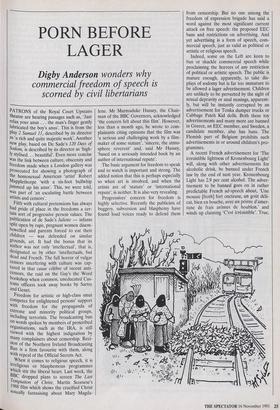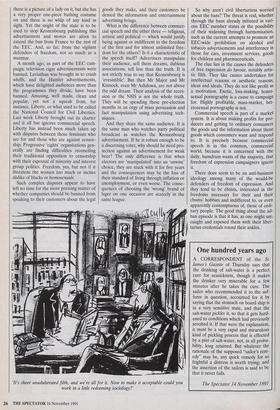PORN BEFORE LAGER
Digby Anderson wonders why
commercial freedom of speech is scorned by civil libertarians
PATRONS of the Royal Court Upstairs theatre are hearing passages such as, 'Just relax your anus ... the man's finger gently lubricated the boy's anus'. This is from the Play 2 Samuel 11, described by its director as 'a rich and quite majestic work'. Another new play, based on De Sade's 120 Days of Sodom, is described by its director as 'high- ly stylised... beautiful'. Even more concise was the link between culture, obscenity and freedom made when a London gallery was Prosecuted for showing a photograph of the homosexual American 'artist' Robert Mapplethorpe 'with a six-foot bullwhip Jammed up his anus'. This, we were told, Was part of 'an escalating battle between artists and censors'.
Filth with cultural pretensions has always had pride of place in the freedoms a cer- tain sort of progressive person values. The publication of de Sade's Juliette — infants split open by rape, pregnant women disem- bowelled and parents forced to eat their Children — was defended on similar grounds, art. It had the bonus that its author was not only 'intellectual', that is, designated so by other 'intellectuals, but dead and French. The full horror of vulgar censors interfering with culture was cap- tured in that cause célèbre of recent anti- censors, the raid on the Gay's the Word bookshop when common, uneducated Cus- toms officers took away books by Sartre and Genet.
Freedom for artistic or high-class smut competes for enlightened persons' support With freedom for the propaganda of extreme and minority political groups, including terrorists. The broadcasting ban On words spoken by members of proscribed organisations, such as the IRA, is still viewed with the highest indignation by many complainers about censorship. Reci- sion of the Northern Ireland Broadcasting Ban is a firm favourite with them, along With repeal of the Official Secrets Act. When it comes to religious speech, it is irreligious or blasphemous programmes Which stir the liberal heart. Last week, the 1313C dropped plans to screen The Last Temptation of Christ, Martin Scorsese's 1988 film which shows the crucified Christ sexually fantasising about Mary Magda-
lene. Mr Marmaduke Hussey, the Chair- man of the BBC Governors, acknowledged 'the concern felt about this film'. However, less than a month ago, he wrote to com- plainants citing opinions that the film was 'a serious and challenging work by a film- maker of some stature', 'sincere, the atmo- sphere reverent' and, said Mr Hussey, 'based on a seriously intended book by an author of international repute'.
The basic argument for freedom to speak and to watch is important and strong. The added notion that this is perhaps especially so when art is involved, and when the artists are of 'stature' or 'international repute', is neither. It is also very revealing.
Progressives' concern for freedom is highly selective. Recently the publicists of buggery, subversion and blasphemy have found loud voices ready to defend them from censorship. But no one among the freedom of expression brigade has said a word against the most significant current attack on free speech: the proposed EEC bans and restrictions on advertising. And yet advertising is a form of speech, com- mercial speech, just as valid as political or artistic or religious speech.
Indeed, some on the Left are keen to ban or shackle commercial speech while proclaiming the horrors of any restriction of political or artistic speech. The public is mature enough, apparently, to take dis- plays of sodomy but is far too immature to be allowed a lager advertisement. Children are unlikely to be perverted by the sight of sexual depravity or anal musings, apparent- ly, but will be instantly corrupted by an advertisement for Tonka dumper trucks or Cabbage Patch Kid dolls. Both these toy advertisements and many more are banned in Greece, an EEC member, and Sweden, a candidate member, also has bans. The Flemish part of Belgium prohibits such advertisements in or around children's pro- grammes.
A recent French advertisement for 'The irresistible lightness of Kronenbourg Light' will, along with other advertisements for alcoholic drink, be banned under French law by the end of next year. ICronenbourg Light has 2.9 per cent alcohol. The adver- tisement to be banned goes on in rather predictable French ad-speech about, 'tine mousse [froth] fort oncteuse, un goCit &h- eat, bien en bouche, avec un pointe darner- tune de frais aromes de houblon.' and winds up claiming 'C'est irresistible'. True, there is a picture of a lady on it, but she has a very proper one-piece bathing costume on and there is no whip of any kind in sight. Yet the might of the state is to be used to stop Kronenbourg publishing this advertisement and moves are afoot to extend the ban from France to the rest of the EEC. And, so far, from the vigilant defenders of freedom, not so much as a murmur.
A month ago, as part of the EEC cam- paign, television cigar advertisements were banned. Leviathan was brought in to crush whiffs, and the Hamlet advertisements, which have delighted audiences more than the programmes they divide, have been banned. Amusing, well made, clean and popular, yet not a squeak from, for instance, Liberty, or what used to be called the National Council for Civil Liberties. Last week Liberty brought out its charter and it all but ignores commercial speech. Liberty has instead been much taken up with disputes between those feminists who are for and those who are against censor- ship. Progressive 'rights' organisations gen- erally are finding difficulties reconciling their traditional opposition to censorship with their espousal of minority and interest group politics. Freedom, yes, but not if it threatens the women too much or incites dislike of blacks or homosexuals.
Such complex disputes appear to have left no time for the more pressing matter of whether companies should be banned from speaking to their customers about the legal goods they make, and their customers be denied the information and entertainment advertising brings.
What is the difference between commer- cial speech and the other three — religious, artistic and political — which would justify being against or indifferent to the freedom of the first and for almost unlimited free- dom for the others? Is it a characteristic of the speech itself? Advertisers manipulate their audience, sell them dreams, dubious associations, tell less than the truth. It is not strictly true to say that Kronenbourg is 'irresistible'. But then Mr Major and Mr Kinnock, even Mr Ashdown, are not above the odd dream. Their analysis of the reces- sion or the NHS is not the whole truth. They will be spending these pre-election months in an orgy of mass persuasion and fact manipulation using advertising tech- niques.
And they share the same audience. It is the same man who watches party political broadcast as watches the Kronenbourg advertisement. If he is robust enough to be a discerning voter, why should he need pro- tection against an advertisement for weak beer? The only difference is that when electors are 'manipulated' into an 'unwise' choice, they are stuck with it for five years and the consequences may be the loss of their standard of living through inflation or unemployment, or even worse. The conse- quences of choosing the 'wrong' brand of lager on one occasion are scarcely in the same league.
'It's sheer unadulterated filth, and we're all for it. Now to make it acceptable could you work in a little redeeming sociology?' So why aren't civil libertarians worried about the bans? The threat is real, whether through the bans already initiated in vari- ous EEC member states or the possibility of their widening through harmonisation, such as the current attempts to promote an EEC-wide prohibition on alcohol and tobacco advertisements and interference in those for cars, investment services, goods for children and pharmaceuticals.
The clue lies in the causes the defenders of free expression do favour, notably artis- tic filth. They like causes undertaken for intellectual reasons or aesthetic reasons, ideas and ideals. They do not like profit as a motivation. Exotic, loss-making, homo- sexual pornography is a cause to campaign for. Highly profitable, mass-market, het- erosexual pornography is not.
Commercial speech is part of a market system. It is about making profits for pro- ducers and getting to ordinary consumers the goods and the information about those goods which consumers want and respond to. It is precisely because commercial speech is in the common, commercial world, because it is concerned with the daily, humdrum wants of the majority, that freedom of expression campaigners ignore it.
There does seem to be an anti-business ideology among many of the would-be defenders of freedom of expression. And they tend to be elitists, interested in the freedoms necessary for their and their chums' hobbies and indifferent to, or even apparently contemptuous of, those of ordi- nary people. The good thing about the ad- ban episode is that it has, as one might say, caught and exposed them with their liber- tarian credentials round their ankles.











































































 Previous page
Previous page